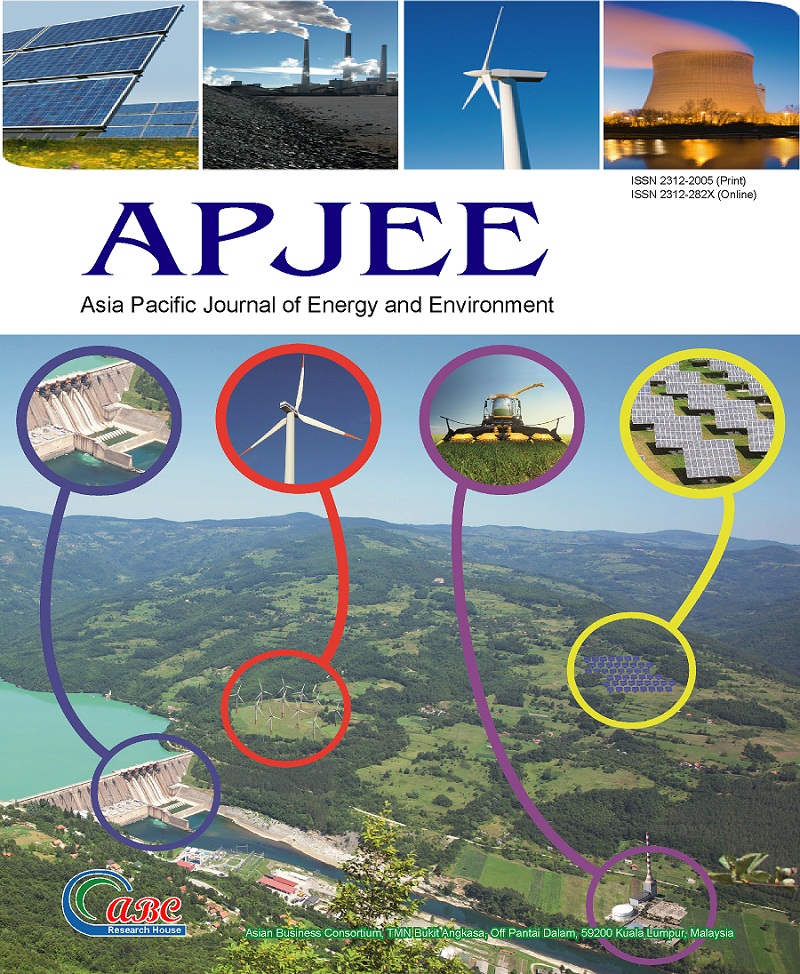Power Electronics Innovations: Improving Efficiency and Sustainability in Energy Systems
DOI:
https://doi.org/10.18034/apjee.v9i2.752Keywords:
Power Electronics, Energy Efficiency, Sustainable Energy, Renewable Energy Systems, Electronic InnovationsAbstract
This study examines how power electronics advancements might alter energy system efficiency and sustainability. The main goals were to study wide bandgap (WBG) semiconductor materials, control algorithms, renewable energy integration, and future trends and problems. Synthesizing current knowledge and trends from peer-reviewed literature, conference papers, and industry reports was done using secondary data. Significant discoveries show that WBG semiconductors like SiC and GaN have superior electrical characteristics, improving power electronic device efficiency and reliability. Model predictive control (MPC) and AI-based control algorithms optimize system performance and handle renewable energy source variability. Modern inverters and converters help integrate renewable energy into the grid, improving energy efficiency and the environment. Policy implications underline the need for supporting regulatory frameworks, research funding, and industry collaboration to reduce cost barriers, ensure interoperability, and optimize power electronics breakthroughs in global energy transitions.
Downloads
References
Addimulam, S., Mohammed, M. A., Karanam, R. K., Ying, D., Pydipalli, R., Patel, B., Shajahan, M. A., Dhameliya, N., & Natakam, V. M. (2020). Deep Learning-Enhanced Image Segmentation for Medical Diagnostics. Malaysian Journal of Medical and Biological Research, 7(2), 145-152. https://mjmbr.my/index.php/mjmbr/article/view/687
Ahmmed. S., Sachani, D. K., Natakam, V. M., Karanam, R. K. (2021). Stock Market Fluctuations and Their Immediate Impact on GDP. Journal of Fareast International University, 4(1), 1-6. https://www.academia.edu/121248146
Anumandla, S. K. R. (2018). AI-enabled Decision Support Systems and Reciprocal Symmetry: Empowering Managers for Better Business Outcomes. International Journal of Reciprocal Symmetry and Theoretical Physics, 5, 33-41. https://upright.pub/index.php/ijrstp/article/view/129
Chen, X., Wen, Y., Li, N. (2016). Energy Efficiency and Sustainability Evaluation of Space and Water Heating in Urban Residential Buildings of the Hot Summer and Cold Winter Zone in China. Sustainability, 8(10), 989. https://doi.org/10.3390/su8100989 DOI: https://doi.org/10.3390/su8100989
Dhameliya, N., Mullangi, K., Shajahan, M. A., Sandu, A. K., & Khair, M. A. (2020). Blockchain-Integrated HR Analytics for Improved Employee Management. ABC Journal of Advanced Research, 9(2), 127-140. https://doi.org/10.18034/abcjar.v9i2.738 DOI: https://doi.org/10.18034/abcjar.v9i2.738
Dhameliya, N., Sai Sirisha Maddula, Kishore Mullangi, & Bhavik Patel. (2021). Neural Networks for Autonomous Drone Navigation in Urban Environments. Technology & Management Review, 6, 20-35. https://upright.pub/index.php/tmr/article/view/141
Emeakaroha, A., Ang, C. S., Yan, Y. (2012). Challenges in Improving Energy Efficiency in a University Campus Through the Application of Persuasive Technology and Smart Sensors. Challenges, 3(2), 290-318. https://doi.org/10.3390/challe3020290 DOI: https://doi.org/10.3390/challe3020290
Gnanapragasam, N. V., Reddy, B. V., Rosen, M. A. (2010). A Methodology for Assessing the Sustainability of Hydrogen Production from Solid Fuels. Sustainability, 2(6), 1472-1491. https://doi.org/10.3390/su2061472 DOI: https://doi.org/10.3390/su2061472
Koehler, S., Dhameliya, N., Patel, B., & Anumandla, S. K. R. (2018). AI-Enhanced Cryptocurrency Trading Algorithm for Optimal Investment Strategies. Asian Accounting and Auditing Advancement, 9(1), 101–114. https://4ajournal.com/article/view/91
López, E., Monzón, A., Pfaffenbichler, P. C. (2011). Assessment of Energy Efficiency and Sustainability Scenarios in the Transport System. European Transport Research Review, 4(1), 47-56. https://doi.org/10.1007/s12544-011-0063-4 DOI: https://doi.org/10.1007/s12544-011-0063-4
Maddula, S. S. (2018). The Impact of AI and Reciprocal Symmetry on Organizational Culture and Leadership in the Digital Economy. Engineering International, 6(2), 201–210. https://doi.org/10.18034/ei.v6i2.703 DOI: https://doi.org/10.18034/ei.v6i2.703
Maddula, S. S., Shajahan, M. A., & Sandu, A. K. (2019). From Data to Insights: Leveraging AI and Reciprocal Symmetry for Business Intelligence. Asian Journal of Applied Science and Engineering, 8(1), 73–84. https://doi.org/10.18034/ajase.v8i1.86 DOI: https://doi.org/10.18034/ajase.v8i1.86
Mohammed, M. A., Kothapalli, K. R. V., Mohammed, R., Pasam, P., Sachani, D. K., & Richardson, N. (2017). Machine Learning-Based Real-Time Fraud Detection in Financial Transactions. Asian Accounting and Auditing Advancement, 8(1), 67–76. https://4ajournal.com/article/view/93
Mullangi, K. (2017). Enhancing Financial Performance through AI-driven Predictive Analytics and Reciprocal Symmetry. Asian Accounting and Auditing Advancement, 8(1), 57–66. https://4ajournal.com/article/view/89
Mullangi, K., Maddula, S. S., Shajahan, M. A., & Sandu, A. K. (2018). Artificial Intelligence, Reciprocal Symmetry, and Customer Relationship Management: A Paradigm Shift in Business. Asian Business Review, 8(3), 183–190. https://doi.org/10.18034/abr.v8i3.704 DOI: https://doi.org/10.18034/abr.v8i3.704
Mullangi, K., Yarlagadda, V. K., Dhameliya, N., & Rodriguez, M. (2018). Integrating AI and Reciprocal Symmetry in Financial Management: A Pathway to Enhanced Decision-Making. International Journal of Reciprocal Symmetry and Theoretical Physics, 5, 42-52. https://upright.pub/index.php/ijrstp/article/view/134
Nizamuddin, M., Natakam, V. M., Sachani, D. K., Vennapusa, S. C. R., Addimulam, S., & Mullangi, K. (2019). The Paradox of Retail Automation: How Self-Checkout Convenience Contrasts with Loyalty to Human Cashiers. Asian Journal of Humanity, Art and Literature, 6(2), 219-232. https://doi.org/10.18034/ajhal.v6i2.751 DOI: https://doi.org/10.18034/ajhal.v6i2.751
Patel, B., Mullangi, K., Roberts, C., Dhameliya, N., & Maddula, S. S. (2019). Blockchain-Based Auditing Platform for Transparent Financial Transactions. Asian Accounting and Auditing Advancement, 10(1), 65–80. https://4ajournal.com/article/view/92
Perez-Sanchez, M., Sanchez-Romero, F. J., Ramos, H. M., López-Jimenez, P. A. (2017). Optimization Strategy for Improving the Energy Efficiency of Irrigation Systems by Micro Hydropower: Practical Application. Water, 9(10), 799. https://doi.org/10.3390/w9100799 DOI: https://doi.org/10.3390/w9100799
Pydipalli, R. (2018). Network-Based Approaches in Bioinformatics and Cheminformatics: Leveraging IT for Insights. ABC Journal of Advanced Research, 7(2), 139-150. https://doi.org/10.18034/abcjar.v7i2.743 DOI: https://doi.org/10.18034/abcjar.v7i2.743
Pydipalli, R., Anumandla, S. K. R., Dhameliya, N., Thompson, C. R., Patel, B., Vennapusa, S. C. R., Sandu, A. K., & Shajahan, M. A. (2022). Reciprocal Symmetry and the Unified Theory of Elementary Particles: Bridging Quantum Mechanics and Relativity. International Journal of Reciprocal Symmetry and Theoretical Physics, 9, 1-9. https://upright.pub/index.php/ijrstp/article/view/138
Ren, J., Ren, X., Liang, H., Dong, L., Zhang, L. (2017). Multi-actor Multi-criteria Sustainability Assessment Framework for Energy and Industrial Systems in Life Cycle Perspective Under Uncertainties. Part 2: Improved Extension Theory. The International Journal of Life Cycle Assessment, 22(9), 1406-1417. https://doi.org/10.1007/s11367-016-1252-0 DOI: https://doi.org/10.1007/s11367-016-1252-0
Richardson, N., Pydipalli, R., Maddula, S. S., Anumandla, S. K. R., & Vamsi Krishna Yarlagadda. (2019). Role-Based Access Control in SAS Programming: Enhancing Security and Authorization. International Journal of Reciprocal Symmetry and Theoretical Physics, 6, 31-42. https://upright.pub/index.php/ijrstp/article/view/133
Rodriguez, M., Shajahan, M. A., Sandu, A. K., Maddula, S. S., & Mullangi, K. (2021). Emergence of Reciprocal Symmetry in String Theory: Towards a Unified Framework of Fundamental Forces. International Journal of Reciprocal Symmetry and Theoretical Physics, 8, 33-40. https://upright.pub/index.php/ijrstp/article/view/136
Rodriguez-Rosa, D., Payo-Gutierrez, I., Castillo-Garcia, F. J., Gonzalez-Rodriguez, A., Perez-Juarez, S. (2017). Improving Energy Efficiency of an Autonomous Bicycle with Adaptive Controller Design. Sustainability, 9(5), 866. https://doi.org/10.3390/su9050866 DOI: https://doi.org/10.3390/su9050866
Rösch, C., Bräutigam, K-r, Kopfmüller, J., Stelzer, V., Lichtner, P. (2017). Indicator System for the Sustainability Assessment of the German Energy System and its Transition. Energy, Sustainability and Society, 7, 1-13. https://doi.org/10.1186/s13705-016-0103-y DOI: https://doi.org/10.1186/s13705-016-0103-y
Sachani, D. K. (2018). Technological Advancements in Retail Kiosks: Enhancing Operational Efficiency and Consumer Engagement. American Journal of Trade and Policy, 5(3), 161–168. https://doi.org/10.18034/ajtp.v5i3.714 DOI: https://doi.org/10.18034/ajtp.v5i3.714
Sachani, D. K. (2020). Assessing the Impact of Brand Loyalty on Tobacco Purchasing Decisions and Spending Patterns. ABC Research Alert, 8(3), 147–159. https://doi.org/10.18034/ra.v8i3.661 DOI: https://doi.org/10.18034/ra.v8i3.661
Sachani, D. K., & Vennapusa, S. C. R. (2017). Destination Marketing Strategies: Promoting Southeast Asia as a Premier Tourism Hub. ABC Journal of Advanced Research, 6(2), 127-138. https://doi.org/10.18034/abcjar.v6i2.746 DOI: https://doi.org/10.18034/abcjar.v6i2.746
Shajahan, M. A. (2018). Fault Tolerance and Reliability in AUTOSAR Stack Development: Redundancy and Error Handling Strategies. Technology & Management Review, 3, 27-45. https://upright.pub/index.php/tmr/article/view/126
Shajahan, M. A. (2021). Next-Generation Automotive Electronics: Advancements in Electric Vehicle Powertrain Control. Digitalization & Sustainability Review, 1(1), 71-88. https://upright.pub/index.php/dsr/article/view/135
Shajahan, M. A., Richardson, N., Dhameliya, N., Patel, B., Anumandla, S. K. R., & Yarlagadda, V. K. (2019). AUTOSAR Classic vs. AUTOSAR Adaptive: A Comparative Analysis in Stack Development. Engineering International, 7(2), 161–178. https://doi.org/10.18034/ei.v7i2.711 DOI: https://doi.org/10.18034/ei.v7i2.711
Vennapusa, S. C. R., Fadziso, T., Sachani, D. K., Yarlagadda, V. K., & Anumandla, S. K. R. (2018). Cryptocurrency-Based Loyalty Programs for Enhanced Customer Engagement. Technology & Management Review, 3, 46-62. https://upright.pub/index.php/tmr/article/view/137
Yarlagadda, V. K., & Pydipalli, R. (2018). Secure Programming with SAS: Mitigating Risks and Protecting Data Integrity. Engineering International, 6(2), 211–222. https://doi.org/10.18034/ei.v6i2.709 DOI: https://doi.org/10.18034/ei.v6i2.709
Ying, D., Patel, B., & Dhameliya, N. (2017). Managing Digital Transformation: The Role of Artificial Intelligence and Reciprocal Symmetry in Business. ABC Research Alert, 5(3), 67–77. https://doi.org/10.18034/ra.v5i3.659 DOI: https://doi.org/10.18034/ra.v5i3.659
Downloads
Published
Issue
Section
License
Copyright (c) 2022 Niravkumar Dhameliya

This work is licensed under a Creative Commons Attribution-NonCommercial 4.0 International License.









